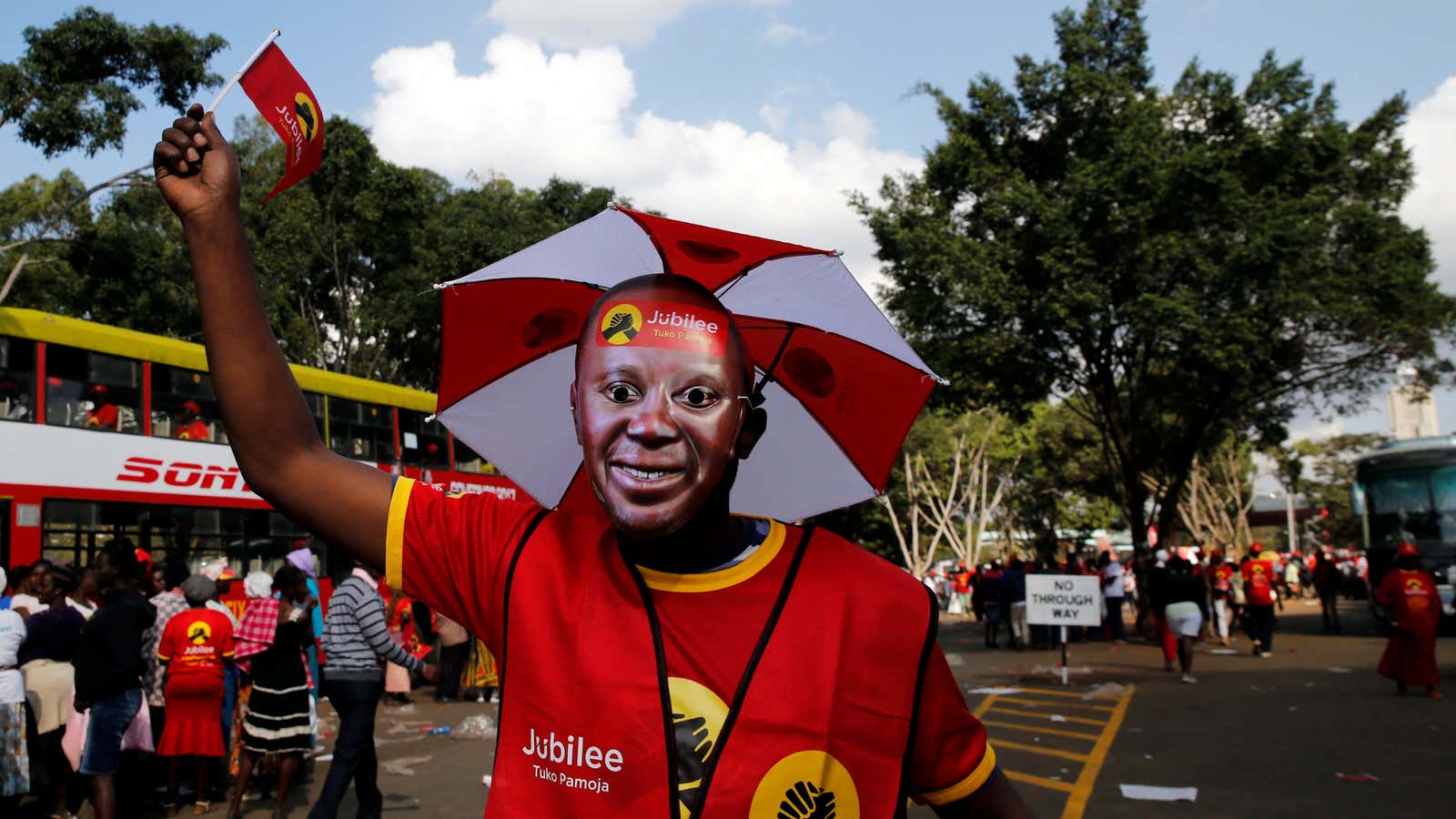Kenya’s presidential vote on Aug. 8 has inspired the use of a wide array of memes, parables, and jokes that have come to define a new political language surrounding the election. These wordplays have also become fodder for both artists and political parties, who have used them to create hit songs and popular slogans to galvanize the masses during rallies.
On Twitter and Facebook, the phrases have also taken a life of their own, evolving into expressions that some foreign elections observers might have trouble understanding. The pervasive use of these phrases is indicative of the participatory nature of Kenya’s locally driven, decentralized politics and shows a nation obsessed with the daily spectacle of politics.
“Tano tena” vs. “Nane nane”
The elections in Kenya are a race between the incumbent president Uhuru Kenyatta and opposition leader Raila Odinga, who is making his fourth try at the presidency. Kenyatta is running on the slogan of tano tena, which translates into “five more years.” The opposition, energized by the administration’s failings, is calling for voters to remove Kenyatta from power on nane nane —Aug. 8, the date of the general elections.
“The road to Canaan”
Opposition leader Raila Odinga has referred to Canaan, the area in ancient Palestine that Israelites considered the biblical land God promised Abraham and his descendants, to symbolize Kenya’s political journey since independence. Odinga, known for his oratory skills, is seen by many voters as a social reformer and a champion of marginalized groups. Likening himself to the prophet Joshua, Odinga has said that if he’s elected, he will lead Kenyans to the promised land.
The Canaan metaphor has ignited some smart, amusing, and slapstick humor that has been widely shared across social media.
“Tibim” and “tialala”
Tibim and tialala are words that were both invented by Paul Ongili, better known as Babu Owino. The former head of the University of Nairobi student organization, he is now a candidate to represent the Embakasi East constituency of Nairobi county in parliament. Owino told Quartz that tibim means “revolution. In this case, political revolution.” Other politicians have also said the word is an acronym that stands for “together in building an irresistible movement.”
Along with tialala, tibim has become a mainstay in opposition rallies across the country. The terms have also both appeared in a viral song that has risen to the top of tunes associated with the campaign trail. Analyzing the word, the writer Alexander Ikawah wrote: ‘Tibim’ is not a nonsense word. It has onomatopoetic meaning. It describes the sound of something being struck. A point hitting home. A final blow. It evokes the emotion of triumph after struggle. A striker might be described as hitting the winning shot ‘Tibim!’ and subsequently scoring.”
“Tuko ndani, ndaani, ndaaani”
Nick Salat, secretary general of Kenya’s oldest political party, coined this term while addressing members of an opposition crowd. The word ndani is Swahili for “inside” and Salat repeated the word to emphasize that his party fully supported Odinga’s party against Kenyatta.
Salat was later forced to retract his position and declare his support for the president’s re-election. The phrase has since become popular, with Kenyans using it to mean they are part of an outfit or movement. Salat has also said he was looking to copyright the phrase.
“Wacha elections ziishe”
Concerns have continued to mount over the prospect of electoral violence. Nairobi is now eerily quiet, with businesses closed and the stream of traffic reduced. As many residents leave the capital to vote in rural areas or to avoid any potential violence, the phrase wacha elections ziishe, or “let the elections end” has become popular to explain why certain events are not taking place or some processes are not moving forward.
